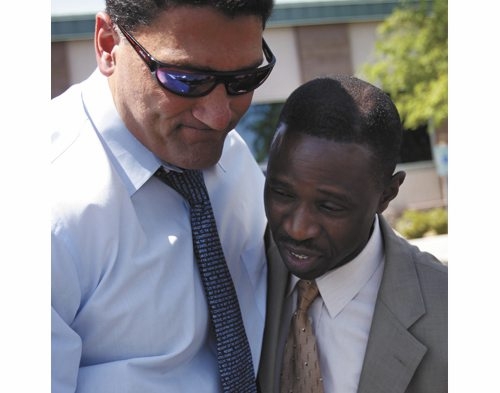Judge rejects bid to deny Fakoya attorney, close case to public
Clark County prosecutors in a contentious Family Court hearing Wednesday argued that Victor Fakoya doesn't have the right to a court-appointed attorney and asked a hearing master to close the courtroom to the public as the Nigerian immigrant fights to regain unfettered access to his own children.
Fakoya could forever lose his parental rights to his two daughters if he does not do what prosecutors want: admit he abused and killed 2-year-old Daniel Jaiyesimi, something the 40-year-old maintains he did not do.
Fakoya spent two years in jail waiting for justice. On Dec. 17, the second jury to hear Fakoya's case found him not guilty of a murder charge. The first trial ended in a hung jury.
Fakoya's defense team has said the continuation of the Family Court case "smacks of retribution" by prosecutors who failed to prove their case in criminal court.
Attorney Kristina Wildeveld on Wednesday asked Hearing Master Brigid Duffy to declare him indigent and to appoint her as his attorney in the Family Court case. Prosecutor Janne Hanrahan opposed the motion, citing case law that says a defendant in a civil matter -- Family Court proceedings are governed by civil law -- is not entitled to court-appointed counsel.
Fakoya, who has maintained his silence outside of court but authorized his attorneys to speak publicly on his behalf, said in court that he believes the county is trying to make him a scapegoat. "I believe I am not being treated fairly by the county," Fakoya said.
Duffy ruled in favor of Fakoya, stating that complicated medical issues in the case make it difficult for a layman to represent himself.
"I'm not going to expect a parent to question your medical experts," Duffy told Hanrahan. Duffy added that she would determine Friday whether Wildeveld is eligible to continue as Fakoya's attorney.
The hearing grew contentious as Hanrahan accused Wildeveld of creating a media circus around the case. The Las Vegas Review-Journal on Sunday first reported Fakoya's ongoing Family Court troubles.
Hanrahan also accused Wildeveld of threatening to run up the legal bill if she continues with the case. Wildeveld denied that, saying past comments about the expense stems from the cost of discovery and legal fees associated with reviewing two six-week murder trials to be rehashed in Family Court. Duffy acknowledged that the attorney who ends up representing Fakoya probably would submit a large bill to the county.
Duffy also rejected Hanrahan's contention that the case should be closed to protect the privacy of Fakoya's children. She said the relevant state law is intended to keep court officials, including prosecutors, from talking about the case -- not to exclude the public. Duffy added that prosecutors were right to say nothing about the case outside of court.
A hearing to essentially re-examine the evidence in Fakoya's case, set for April 28, was also delayed as that portion of the case is being moved to District Judge Steven Jones, who is handling adjudication hearings in Family Court, Duffy said. Fakoya was found not guilty in criminal court, but the U.S. Constitution's Fifth Amendment, known for prohibiting double jeopardy or trying someone for the same crime after an acquittal, isn't a factor in Family Court, where legal actions are aimed at protecting children rather than proving guilt.
Authorities believed Daniel, whose family shared the Fakoya home, died in August 2008 as a result of child abuse. Fakoya was the last adult known to have been with him.
But during two trials, testimony from myriad medical experts failed to narrow down exactly what caused the boy's death or prove an injury was caused by Fakoya. Daniel was sick for weeks prior to his death, and there was evidence to support five possible causes. Only one pointed to abuse, Fakoya's defense pointed out.
The Family Court case was to be resolved before his criminal trial. Defense attorneys and prosecutors had agreed to resolve the case if Fakoya admitted he was unable to care for his children because of incarceration. Fakoya could have taken parenting and anger management classes and the matter would have been resolved.
On Dec. 22, five days after Fakoya's acquittal, the county lawyers resubmitted the original petition, stating that Fakoya's children needed protection because he "is a person responsible for their welfare and another child has died as a result of abuse by Victor Fakoya."
Prosecutors again offered to let Fakoya dispose of the case, but this time they mandated child abuse counseling, which would require that he admit to abusing Daniel. Failing to meet the requirements would result in permanent termination of his parental rights.
Hanrahan said in court Wednesday that Fakoya's attorneys knew that if he was acquitted in the criminal court case prosecutors would move forward with the Family Court case.
Meanwhile, Fakoya cannot move back into his own home and is allowed only supervised visits with daughters Elizabeth, 5, and Christina, 3. Family Services case workers have asked that the case against Fakoya be dropped, and are allowing his wife, Lola Fakoya, to supervise those visits.
Hanrahan said Wednesday that a Family Services manager was available to testify in support of the prosecutors' petition against Fakoya. However, the manager did not address the court as Duffy focused on the issue of Fakoya's representation.
In the audience were Lisa Cofer and Hale Benton, jurors from Fakoya's earlier trials who have expressed outrage that the Family Court case is ongoing. They attended Wednesday's hearing to support him.
Contact reporter Francis McCabe at fmccabe@reviewjournal.com or 702-380-1039.






















